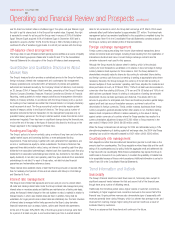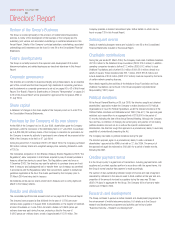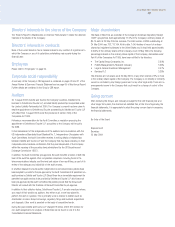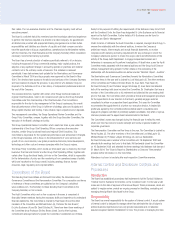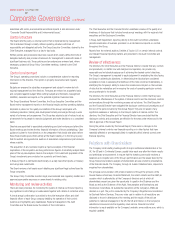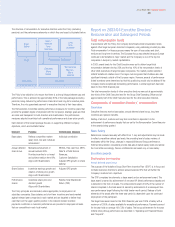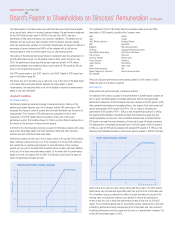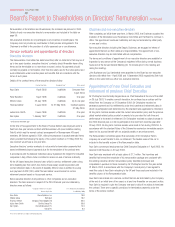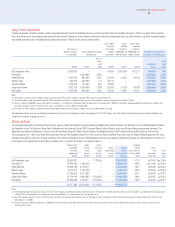Vodafone 2004 Annual Report Download - page 56
Download and view the complete annual report
Please find page 56 of the 2004 Vodafone annual report below. You can navigate through the pages in the report by either clicking on the pages listed below, or by using the keyword search tool below to find specific information within the annual report.
Introduction
The Board has delegated to the Remuneration Committee the assessment and
recommendation of policy on remuneration for executive directors.
At the 2002 AGM, shareholders approved a new remuneration policy (“the Policy”) the
key principles of which are as follows:
•the expected value of total remuneration must be benchmarked against the
relevant market;
• a high proportion of total remuneration is to be delivered through performance-
related payments;
•performance measures must be balanced between absolute financial measures
and sector comparative measures to achieve maximum alignment between
executive and shareholder objectives;
•the majority of performance-related remuneration is to be provided in the form of
equity; and
•share ownership requirements are to be applied to executive directors.
The current Policy was produced following extensive consultation with shareholders
and institutional bodies in 2001 and 2002. In the two years since the Policy was
introduced, the Chairman and the Chairman of the Remuneration Committee have
maintained proactive annual dialogue on remuneration matters with the Company’s
major shareholders and relevant institutions. Extensive consultations with shareholders
were held again in 2003 and 2004. The objective of this dialogue is to provide
information about the Company and its views on remuneration issues and to listen to
shareholders’ opinions on any proposed adjustments to policy implementation.
The Remuneration Committee strives to ensure that the Policy provides a strong and
demonstrable link between incentives and the Company’s strategy and sets a
framework for remuneration that is consistent with the Company’s scale and scope. As
a result of this year’s review, the Remuneration Committee has concluded that the
existing policy continues to serve the Company and shareholders well and will remain
in place for the 2005 financial year. The Committee has also reviewed the
effectiveness of the current policy and is satisfied that the incentive plans have
delivered, or are forecast to deliver, rewards that are consistent with the Company’s
performance achievement.
At the 2004 AGM, shareholders will be invited to vote on the Board’s report to
shareholders on directors’ remuneration. The chart that follows shows the
performance of the Company relative to the FTSE100 index and the FTSE Global
Telecommunications index, which are the most relevant indices for the Company.
It should be noted that the performance of the Company shown by the graph is not
indicative of vesting levels under the Company’s various incentive plans.
Remuneration Committee
The Remuneration Committee consists of independent non-executive directors and the
Company Chairman. Penny Hughes (Chairman), Dr Michael Boskin, Lord MacLaurin,
and Professor Jürgen Schrempp all continue as members. Sir David Scholey stepped
down from the Committee in September 2003. He was replaced by Luc Vandevelde
who joined the Company as a non-executive director on 1 September 2003.
The Board has considered whether or not it remains appropriate for the Company
Chairman to continue to be a member of the Remuneration Committee. The
conclusion is that the Chairman provides important contributions to the work of the
Committee, for example in his contact with shareholders and management, and
therefore his membership remains appropriate.
The Chief Executive attends meetings of the Remuneration Committee, other than
when his own remuneration is being discussed. The Remuneration Committee met on
five occasions during the year.
The Remuneration Committee appointed and received advice from Towers Perrin
(market data and advice on market practice and governance) and Kepler Associates
(performance analysis and advice on performance measures and market practice) and
received advice from the Group Human Resources Director and the Group
Compensation and Benefits Director. The advisers also provided advice to the
Company on general human resource and compensation related matters.
Remuneration Policy
The Policy was approved by shareholders in July 2002. The Policy is set out below:
Vodafone Group Plc Annual Report 2004
54
Board’s Report to Shareholders on Directors’ Remuneration
Historical Total Shareholder Return (“TSR”) Performance Growth
in the value of a hypothetical £100 holding up to March 2004
FTSE Global Telecoms and FTSE 100 Comparison Based on
30 trading day average values
£20
£40
£60
£80
£100
£120
£140
Vodafone Group Plc
FTSE 100
FTSE Global Telecoms
£160
£180
March 1999 March 2000 March 2001 March 2002 March 2003 March 2004
Value of Hypothetical £100 Holding
Graph supplied by Towers Perrin and calculated according to a methodology that is compliant with the requirements
of the regulations. Data sources: FTSE and Datastream.
The overriding objective of the Policy on incentives is to ensure that Vodafone is
able to attract, retain and motivate executives of the highest calibre essential to
the successful leadership and effective management of a global company at the
leading edge of the telecommunications industry.
To achieve this objective, Vodafone, from the context of its UK domicile, takes into
account both the UK regulatory framework, including best practice in corporate
governance, shareholder views, political opinion and the appropriate geographic
and nationality basis for determining competitive remuneration, recognising that
this may be subject to change over time as the business evolves.
The total remuneration will be benchmarked against the relevant market.
Vodafone is one of the largest companies in Europe and is a global business;
Vodafone’s policy will be to provide executive directors with remuneration
generally at levels that are competitive with the largest companies in Europe. A
high proportion of the total remuneration will be awarded through performance-
related remuneration, with phased delivery over the short, medium and long term.
For executive directors, approximately 80% of the total expected remuneration will
be performance-related. Performance measures will be balanced between
absolute financial measures and sector comparative measures to achieve
maximum alignment between executive and shareholder objectives.
All medium and long term incentives are delivered in the form of Vodafone shares
and options. Executive directors are required to comply with share ownership
guidelines.


